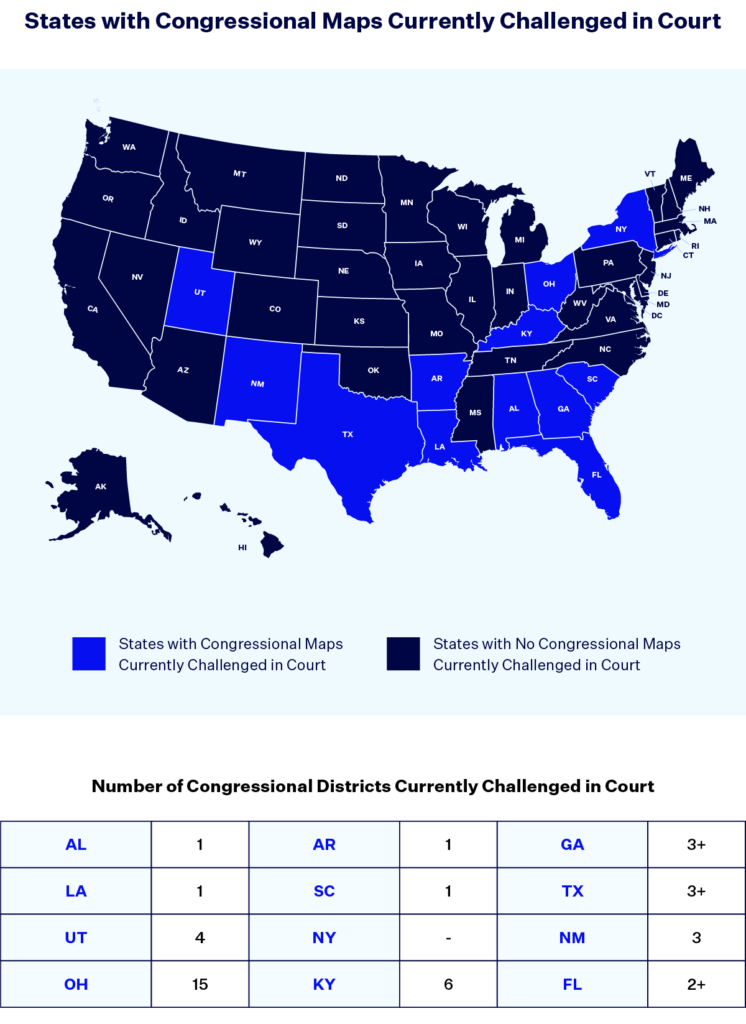Litigation That Could Impact Congressional Maps Before 2024

On July 21, Alabama Republicans blatantly ignored a federal court order and enacted a congressional map with only one majority-Black district when two are required. This flagrant defiance is almost certain to result in a court-appointed special master redrawing the state’s congressional map before the 2024 election, but Alabama is not the only state where maps could be redrawn before the next federal election.
In close national elections like the 2022 midterm elections, the outcome of litigation can have a huge impact on the final results. The decisions of courts in redistricting litigation contributed to the Republican Party’s current margin in the U.S. House of Representatives. With 12 congressional maps still subject to litigation and at least 40 districts at issue, decisions in these cases stand to impact control of the House in 2024 and beyond.
In federal court, pro-voting forces across the deep south are fighting congressional maps that dilute the voting strength of minority voters. In Texas, seven consolidated federal lawsuits are attempting to ensure voters of color have the opportunity to elect a candidate of their choice. Many of these cases bring claims under Section 2 of the Voting Rights Act (VRA), which was recently upheld in the U.S. Supreme Court’s decision in Allen v. Milligan. In state courts, another bucket of lawsuits challenge partisan gerrymandering, unconstitutional processes and more.
Ongoing congressional redistricting litigation has the potential to determine how communities are represented in states across the country, remedy discrimination in map-drawing and have implications for partisan gerrymandering claims.
According to Democracy Docket’s database of over 600 lawsuits, there are currently 26 lawsuits across 12 states that challenge congressional maps; 20 lawsuits are pending in federal court and six cases are pending in state court.
Congressional maps could change in 12 states due to ongoing litigation. At least 40 districts are currently being challenged.

Alabama: 1 Challenged District
Alabama has seven congressional districts that are currently represented by six Republicans and one Democrat in the House. In 2021, three lawsuits were filed challenging Alabama’s congressional map.
Two of Alabama’s congressional districts should be majority-Black districts per federal court order. Currently, only one district, the 7th Congressional District, is a majority-Black district.
Status: Alabama’s congressional map should change before the 2024 election as the state was ordered by a court to include a second majority-Black district. The case is currently pending before a federal district court.
The lawsuits were eventually consolidated but only two lawsuits bringing claims under Section 2 of the VRA were appealed up to the U.S. Supreme Court. On June 8, 2023, the Court upheld Section 2 and affirmed a lower court ruling that required Alabama to draw a congressional map with a second majority-Black district. The Republican-controlled Legislature did not comply, so the map will likely be redrawn by a special master appointed by a federal district court.
Arkansas: 1 Challenged District
Arkansas has four congressional districts. All four districts are currently represented by Republicans in the House.
Two separate lawsuits are pending in different court levels regarding Arkansas’ congressional map. Both lawsuits challenge the composition of Arkansas’ 2nd Congressional District.
Status: The U.S. Supreme Court will issue a decision next term in Simpson v. Thurston. Litigation is ongoing before the district court in Christian Ministerial Alliance v. Thurston.
Christian Ministerial Alliance v. Thurston
One lawsuit arguing that the map violates Section 2 of the VRA and the U.S. and Arkansas Constitutions is currently pending before the U.S. Supreme Court, which is required to issue a decision in the case. A separate lawsuit arguing that the map is an unconstitutional racial gerrymander is currently pending before a federal district court.
Florida: 2+ Challenged Districts
Florida has 28 congressional districts that are currently represented by 20 Republicans and eight Democrats. Two lawsuits challenge Florida’s congressional map: one in state court and one in federal court. Both of the lawsuits challenge the congressional map with a specific emphasis on Congressional District 5.
Status: Litigation is ongoing in both cases. A trial will be held in the state-level case from Aug. 21-August 30.
One lawsuit is ongoing in federal court and alleges that the map is unconstitutionally racially gerrymandered.
A different lawsuit in state court argues that the congressional map violates multiple provisions of the Fair Districts Amendment of the Florida Constitution by diminishing the ability of Black Floridians to elect their candidates of choice, particularly in northern Florida and the 5th Congressional District.
Georgia: 3+ Challenged Districts
The Peach State has 14 congressional districts currently represented by five Democrats and nine Republicans in the House. Three lawsuits challenge Georgia’s congressional map.
One lawsuit (Common Cause) challenges the 6th, 13th and 14th Congressional Districts for being unconstitutional racial gerrymanders. Two lawsuits argue that the map should have an additional majority-Black congressional district in the western Atlanta metropolitan area.
Status: There will be a trial in one lawsuit (Pendergrass) on Sept. 5, 2023. Two lawsuits are awaiting decisions on summary judgment.
Georgia State Conference of the NAACP v. Georgia
One lawsuit alleges that the congressional map violates Section 2 of the VRA (Pendergrass), one alleges that the map violates the 14th Amendment and Section 2 of the VRA (Georgia State Conference of the NAACP) and one alleges that the map solely violates the 14th Amendment (Common Cause).
Kentucky: 6 Challenged Districts
Kentucky has six congressional districts currently represented by five Republicans and one Democrat. One lawsuit challenges Kentucky’s congressional map.
Status: This case is currently pending before the Kentucky Supreme Court.
One lawsuit filed on behalf of a group of voters and the Kentucky Democratic Party challenges Kentucky’s congressional map arguing that the map is a partisan gerrymander that favors Republicans and unnecessarily splits counties in violation of the Kentucky Constitution.
Louisiana: 1 Challenged District
Louisiana has six congressional districts currently represented by five Republicans and one Democrat in the House. Two consolidated lawsuits challenge the state’s congressional map alleging that the map violates Section 2 of the VRA by diluting the voting power of Black voters. The plaintiffs ask for a second majority-Black district to be drawn.
Status: Louisiana’s congressional map is currently blocked and a hearing will be held from Oct. 3-5 to determine what steps will be taken to implement a remedial map for 2024.
In these consolidated cases, the plaintiffs won a preliminary injunction last year against the map and the creation of a second minority-opportunity district was ordered. That injunction was stayed by the U.S. Supreme Court pending the resolution of Allen; the case is now back before the district court.
New York: Entire map challenged for alleged procedural violations
New York has 26 congressional districts currently represented by 15 Democrats and 11 Republicans. One lawsuit challenges the process used to enact maps so it does not challenge specific districts. Instead, it requests that the congressional map be redrawn and submitted to the Legislature.
Status: On July 13, an intermediate appellate court ruled that the IRC must reconvene and redraw the congressional map. Republicans appealed the decision to the state’s highest court on July 25.
Hoffmann v. New York State Independent Redistricting Commission
New York voters filed a lawsuit against the New York State Independent Redistricting Commission (IRC) and its members alleging that the IRC failed to complete its mandatory redistricting duties and requesting that the IRC reconvene and draw a congressional map to submit to the Legislature.
New Mexico: 3 Challenged Districts
New Mexico has three congressional districts all currently represented by Democrats. One lawsuit challenges New Mexico’s congressional map.
Status: On July 5, the New Mexico Supreme Court ruled that partisan gerrymandering claims are justiciable under the New Mexico Constitution and sent the lawsuit back to the trial court to issue a decision in the case by October 1, 2023.
Republican Party of New Mexico v. Oliver
In 2021, the Republican Party of New Mexico, state Sen. David Gallegos (R), former state Sen. Timothy Jennings (D) and a group of Republican voters filed a lawsuit challenging New Mexico’s congressional map drawn with 2020 census data. The plaintiffs ask the court to strike down the map and order the creation of a “partisan-neutral” map.
Ohio: 15 Challenged Districts
Ohio has 15 congressional districts that are currently represented by 10 Republicans and five Democrats. Two separate lawsuits filed by pro-voting parties challenge Ohio’s congressional map.
Status: Ohio’s congressional map was struck down two separate times, but now the case is currently pending before the Ohio Supreme Court after the U.S. Supreme Court vacated the Ohio Supreme Court’s decision to strike down the map.
League of Women Voters of Ohio v. LaRose
Two lawsuits challenge Ohio’s congressional map alleging that it is an unconstitutional partisan gerrymander.
By Katy Shanahan, Democracy Docket Contributor
South Carolina: 1 Challenged District
South Carolina has seven congressional districts currently represented by six Republicans and one Democrat. One lawsuit challenges South Carolina’s congressional map. The plaintiffs challenged the 1st, 2nd and 5th Congressional Districts. In January 2023, a federal court struck down the 1st Congressional District for being an unconstitutional racial gerrymander, but kept the 2nd and 5th districts in place.
Status: A three-judge panel struck down the configuration of the 1st Congressional District and Republican officials appealed to the U.S. Supreme Court, which will hear the case in full on Oct. 11, 2023.
South Carolina NAACP v. McMaster
One lawsuit — brought by the South Carolina State Conference of the NAACP — argues that South Carolina’s congressional map intentionally discriminates against Black voters and is an unconstitutional racial gerrymander.
Texas: 3+ Challenged Districts
Texas has 38 congressional districts currently represented by 25 Republicans and 13 Democrats. Seven consolidated lawsuits challenge Texas’ congressional map and advocate for fairer representation for voters of color including Latino, Black and AAPI voters.
Status: Disputes regarding discovery are ongoing. Once they are resolved, a trial will be scheduled.
League of United Latin American Citizens (LULAC) v. Abbott
Fair Maps Texas Action Committee v. Abbott
Mexican American Legislative Caucus v. Texas
Texas State Conference of the NAACP v. Abbott
These seven lawsuits challenging the map are consolidated under LULAC v. Abbott. Together, these seven lawsuits challenge Texas’ congressional map, arguing that the state should add at least three additional minority-opportunity districts.
Utah: 4 Challenged Districts
Utah has four congressional districts. All four districts are currently represented by Republicans. One lawsuit challenges Utah’s congressional map.
Status: An appeal is currently pending before the Utah Supreme Court.
League of Women Voters of Utah v. Utah State Legislature
The League of Women Voters of Utah, Mormon Women for Ethical Government and individual voters filed a lawsuit challenging Utah’s new congressional map arguing that the new map is a partisan gerrymander that favors Republicans by “cracking” non-Republican voters across districts in violation of the Utah Constitution.
Rachel Selzer contributed to the research for this reporting.